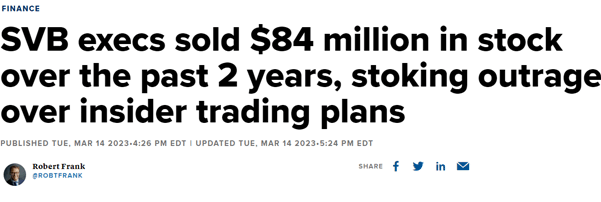The financial market is a wide one, with industries like forex, cryptocurrencies, stocks, and bonds being valued at trillions of dollars.
As a result, in an industry like this, there are always people who try to cheat and make a strong return. One of these ways is known as insider trading.
In this article, we will explain what insider trading is, how it works, why it is illegal, and how to avoid it.
What is insider trading?
Insider trading is defined as a situation where a person buys assets using important material non-public information. This information is one that could have an impact on an asset movement.
A good example is where a hedge fund receives material information like earnings before the results are released to the public.
In this case, the hedge fund will be able to position their trades in anticipation of the official release. If a company has strong results, the fund will open a buy position. On the other hand, if the company publishes weak results, the hedge fund will typically open a sell position.
In all, insider trading is considered wrong because it gives an advantage to a small group of people at the expense of the broader market. This happens in all industries but it is most common in the stock and cryptocurrency market.
Is insider trading illegal?
Yes, insider trading is illegal in most countries (whereas day trading is legal). Regulatory agencies have created laws that prevent people from using material inside information without following the due process.
In the United States, this practice can lead to years in prison, large fines, and even expulsion from the financial industry.
According to the Securities and Exchange Commission, the maximum penalty for insider trading is 20 years. For an individual, the maximum fine for this fraud is $5 million while for entities like hedge funds is $25 million.
Further, individuals who engage in insider trading can be barred from the financial market in perpetuity or for some time. Meanwhile, the person who provides these materials can be forced to pay over $1 million in fines.
How insider trading works
Insider trading often takes many forms in the market. The most common approach is where a rogue employee works with a player in the financial industry. In this case, the employee will often provide information about the company to the trader, who will then use it to execute trades.
Another way in which insider trading works is where a company’s senior mangement works with traders and investors. These entities then collaborate in a way that benefits the trader.
Another grey area relates to politicians. In the US, members of the house of Representatives and senate are allowed to trade stocks. The same is true for officials at the Federal Reserve.
Therefore, these people tend to have material information that could affect the financial market. For example, it was widely reported that some politicians dumped stocks in March 2020 before the Covid illness was declared a global pandemic.
Examples of insider trading cases
There have been many insider trading cases. The most popular one is the case of Steve Cohen, one of the best-known hedge fund managers in the world.
He was once the best-performing manager through his firm, SAC Capital. American prosecutors sued his firm for insider trading and ordered him to stay away from the industry for a few years. He also paid a $1.8 billion fine to regulators.
The other good example is Raj Rajaratnam, another hedge fund manager who was sentenced to jail for about ten years for cheating the market.
How to use insider information legally
While this practice is illegal, there are several approaches that traders use to take advantage of these activities.
Insider stock sales
One of the best ways to use insider information legally is to check out actions of a company’s insiders. In the US, managers and directors are mandated by law to ensure that they report all stock purchases and sales.
Therefore, if you take time time to track a company’s insider transactions, you will be at a good position to know whether a company is a good buy or not. In most cases, insiders tend to buy stocks when they believe that the company is doing well and vice versa.
Related » Stock Trading Strategies for all Market Conditions
There are many examples for this. For example, it was reported that Silicon Valley Bank insiders dumped their stock before the bank collapsed.


There are other examples of a situation where executives sell shares before a major event. For example, the CEO and the family of Ernie Garcia, the controlling family of Carvanaa, sold shares worth billions of dollars before the stock collapsed.
Related » How to Trade in a Bear Market?
Politicians disclosures
Another way to trade inside information legally is to use disclosures of politicians. In the US, politicians are required by law to ensure that they publish their holdings periodically. In some periods, you can track the stocks they are buying and invest in them.
However, the challenge here is that these disclosures tend to be a bit late since they are required to disclose them every quarter.
In-depth analysis
Another way of using insider information legally is to conduct in-depth analysis on key assets using materials that are public.
For example, for e-commerce websites, you can use platforms like SimilarWeb to check the number of visitors in their websites and those who are downloading their apps.
The same is true for cryptocurrencies. For crypto tokens like Ethereum and Solana, you can track activities of the biggest players in the ecosystem using on-chain analysis.
How insider trading affects markets
The reality is that this practice tends to benefit a small number of people at the expense of the market. Here are some of the top ways in which insider trading affects the markets.
Loss of trust in markets
The most important consequence of insider trading is that it affects the overall confidence among market participants.
A good example of this is in the penny stock market, which has a large proportion of insiders. In most cases, many people have completely avoided the penny stock market in the industry.
Unexplained market movements
Another consequence of insider trading is that it leads to unexplained market movements in the stock market.
As a result, it can lead to significant profits for a small group of people at the expense of most traders.
Companies Reputation
Insider trading can lead to a major reputational damage. In many cases, good companies that were engaged in insider trading tends to suffer irreparable damage.
Also, these firms tend to underperform in the market.
FAQs
Is insider trading illegal?
How is insider trading detected?
When is insider trading legal?
External useful resources
- Insider Trading Policy – SEC
